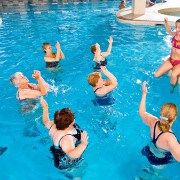 Photo: Getty Images
Photo: Getty Images
We all hit our physical peak around 25. Then the slow decline begins.
Once into our 50's, we'll find ourselves reaping whatever we've been sowing. If we haven't been paying attention, we can lose 25 percent of our muscle strength by 65.
Active older persons have a better chance of being able to continue making their own decisions and living their own lives.
Fortunately you don't have to be an Xtreme sport hero into your 80's in order to stay fit. And fortunately, if you haven't been active, you don't have to grab your skateboard and launch yourself into the thick of things. You can start ... slowly.
In an April 2, 2011 article on seniorjournal.com, Mark Peterson, Ph.D., encouraged adults over 50 years of age to try resistance exercise to increase their lean muscle tissue and their strength. Peterson is a research fellow in the U-M Physical Activity and Exercise Intervention Research Laboratory at the Department of Physical Medicine and Rehabilitation.
Sedentary adults can lose 0.4 pounds of muscle every year after 50. But research from the U-M indicated that 18 to 20 weeks of progressive resistance training can build up 2.42 pounds of lean muscle and increase overall strength by 25 to 30 percent.
Peterson recommended exercises that use your body mass to work out. He suggested modified push-ups, lying hip bridges, squats and rising from a chair as well as tai chi, yoga and Pilates.
The National Institute of Health's Medline Plus exhorted older adults to get active to protect themselves from high blood pressure and heart disease. The goal is to raise your heart rate for half an hour a day.
Exercises to increase balance and strength are recommended. Light weights will prevent muscle and bone density loss.
Muscle strength can improve from just 8 weeks of resistance training, even in a 90 year old, according to sportsci.org.
Sedentary older adults can lose 10 cm of flexibility in the lower back and hips, eventually becoming unable to get up and about. Putting the main body joints through full range of motion every day can help.
Bone density loss can start in the 30's. For women, loss speeds up around menopause. A senior can be at risk for bone fractures that can be life-changing. Yet up into the 80's, load-bearing exercise can slow, halt and possibly reverse bone mineral loss.
Hormonal changes can contribute to depression, diabetes, obesity and greater vulnerability to disease. Moderate exercise can improve each of these conditions.
Walking is safer than jogging or running, with less chance of falling or damaging the knees. Water exercise is protective of joints.
Increasing activity levels won't restore your youth. But it can keep you from some further loss, and can help prevent chronic disease.
Sportsci.org declared that your biological age can drop by up to 20 years. Your life expectancy can rise, and disabilities decrease. You may not only live longer, but enjoy it while you're about it.
Resources:
Senior Citizens Equate Fitness to Health Freedom
http://www.healthtalkandyou.com/senior-citizens-equate-fitness-to-health-freedom
Senior Citizens Can Be Older and Stronger with Progressive Resistance Training
http://seniorjournal.com/NEWS/Fitness/2011/20110404-SenCitCanBeOlder.htm
Senior Citizen Activities
http://www.ehow.com/way_5445596_senior-citizen-activities.html
Aging and Exercise
http://www.sportsci.org/encyc/agingex/agingex.html
Reviewed June 27, 2011
Edited by Alison Stanton
Visit Jody's website and blog at http://www.ncubator.ca and http://ncubator.ca/blogger






Add a CommentComments
There are no comments yet. Be the first one and get the conversation started!